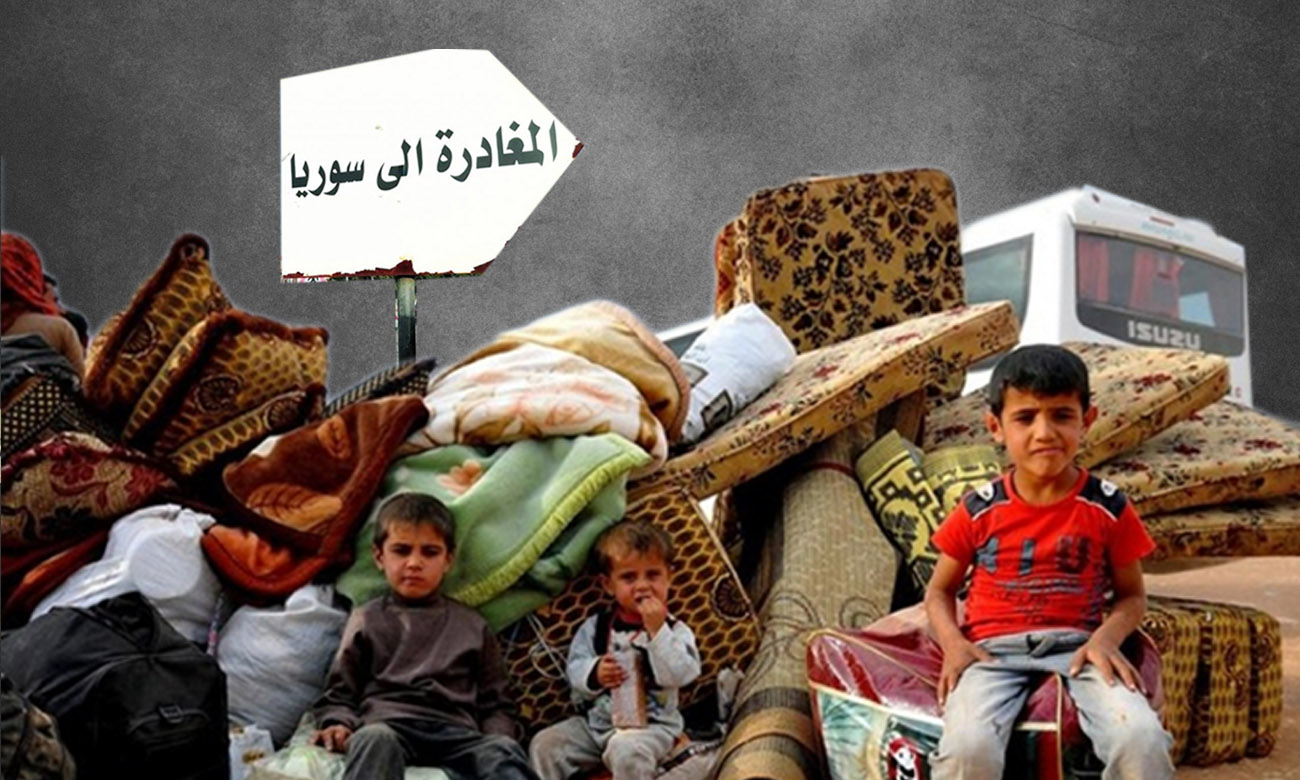


A Syrian family in a refugee camp in the Lebanese border town of Arsal (edited by Enab Baladi)


Hussam al-Mahmoud | Hassan Ibrahim | Muhammed Fansa
The Lebanese political and media discourse focuses heavily on the Syrian refugees and holds them responsible for the deteriorating living situation and the dire economic reality in Lebanon.
Although the number of Syrian refugees, according to the Human Rights Watch (HRW), is about 852,000, compared to the 1.5 million figure that Lebanese President Michel Aoun talks about in every official statement or speech on refugees.
The economic and living crises in Lebanon have for years turned into a routine for residents, citizens, and refugees. Perhaps the most recent of these crises is the difficulty in obtaining bread this July, a crisis that forced the Lebanese to wait in crowded queues at the oven windows of some areas.
This crisis prompted some voices to demand the preference of the Lebanese citizen over others and the adoption of a system of priorities when selling bread. Some voices also blamed the Syrian refugees for the deterioration of the living reality in Lebanon, invoking the background for any talk of this kind.
Those who demand the return of Syrian refugees from Lebanon claim that Lebanon is unable to bear the “burdens of asylum,” which makes the Syrian refugees prey to hate speech, rejection, and racism, in addition to the many pressures they naturally face.
With a group of analysts and legal and human rights researchers, Enab Baladi discusses in this file some of the difficulties and obstacles faced by the Syrian refugee in Lebanon, including the deportation plan as the officials in Lebanon and the Syrian regime decided that “Syria is safe.”
The file also discusses the legal bases that the Syrian refugee can resort to in the face of potential risks he/she may be exposed to.
Since last July, an escalation against Syrian refugees in Lebanon surged on more than one level, starting with the statements of the Lebanese caretaker Minister of Displaced Persons Issam Sharaf al-Din that Lebanon plans to deport 15,000 displaced Syrians per month.
The Minister said that Syria has become safe and that the war has ended, he added.
Sharaf al-Din also said, during his visit to Baabda Palace and his meeting with Lebanese President Michel Aoun, that it is “totally unacceptable that the displaced Syrians should not return to their country after the war has ended and it has become safe.”
At the same time, Sharaf al-Din spoke of a plan to form a tripartite committee comprising the Syrian regime and the UNHCR, in addition to a quadripartite committee consisting of Turkey, Iraq, Jordan, and Lebanon, to achieve this “return.”
These statements were followed by Sharaf al-Din, on the 9th of the same month, with a request that Lebanon addressed to the United Nations High Commissioner for Refugees to deport Syrian political refugees to a third country.
On 13 July, the Lebanese President expressed his refusal to integrate Syrian refugees into the societies that host them, stressing that such a step is not acceptable.
Aoun reiterated the Lebanese position demanding the return of Syrian refugees from Lebanon to Syria in his meeting with the Deputy Special Envoy for Syria, Najat Rushdi.
Nadim Gemayel, a member of the Lebanese Kataeb Party, also stated on 11 July on his official Twitter account that “For Lebanon, the return of Syrian refugees is not an option, but rather a national necessity,” as he put it.
“If Syria is not safe for the Syrians to return, then their stay is not safe for the Lebanese, and recent events are proof of that, so either return or return,” Gemayel tweeted.
In his turn, Lebanon’s Prime Minister, Najib Mikati, threatened on 20 June the Western countries to adopt a position that would not please the West by working to expel Syrians from Lebanon by what he described as “legal methods” through “firmly applying Lebanese laws” unless the international community cooperated with Lebanon to return them.
The surge in political escalation against the refugees was accompanied by another wave by media and religious figures, in which a Lebanese cleric blamed the Syrians for the deteriorating situation in Lebanon, while another cleric defended the refugees in Lebanon, blaming the ruling political class for the decline in Lebanon in more than one direction.
This discourse, which turned into a station of attraction, was shared by the Lebanese anchorwoman, Dalia Ahmed, who herself was subjected to a wave of bullying and racism months ago over her brown skin, as she demanded the return of Syrian refugees to their country.
“When the Syrian state tells a refugee to return and that there are safe areas, this is met with a denunciation by the international community, but for a country like Lebanon that is heading towards hell and asking for help and clemency for its situation, with regard to the refugee situation, this is said to be contrary to human rights,” according to Ahmed.
The rhetoric of incitement and hatred was reflected on the ground, where Syrians were subjected to racial discrimination that amounted to violence and physical assault.
These practices also prompted UNHCR, the United Nations High Commissioner for Refugees, to ask the Lebanese authorities to ensure the rule of law and an immediate end to violence and discrimination against the targets residing within Lebanese territory.
It also expressed its “grave concern” about restrictive practices and discriminatory measures against refugees in Lebanon.
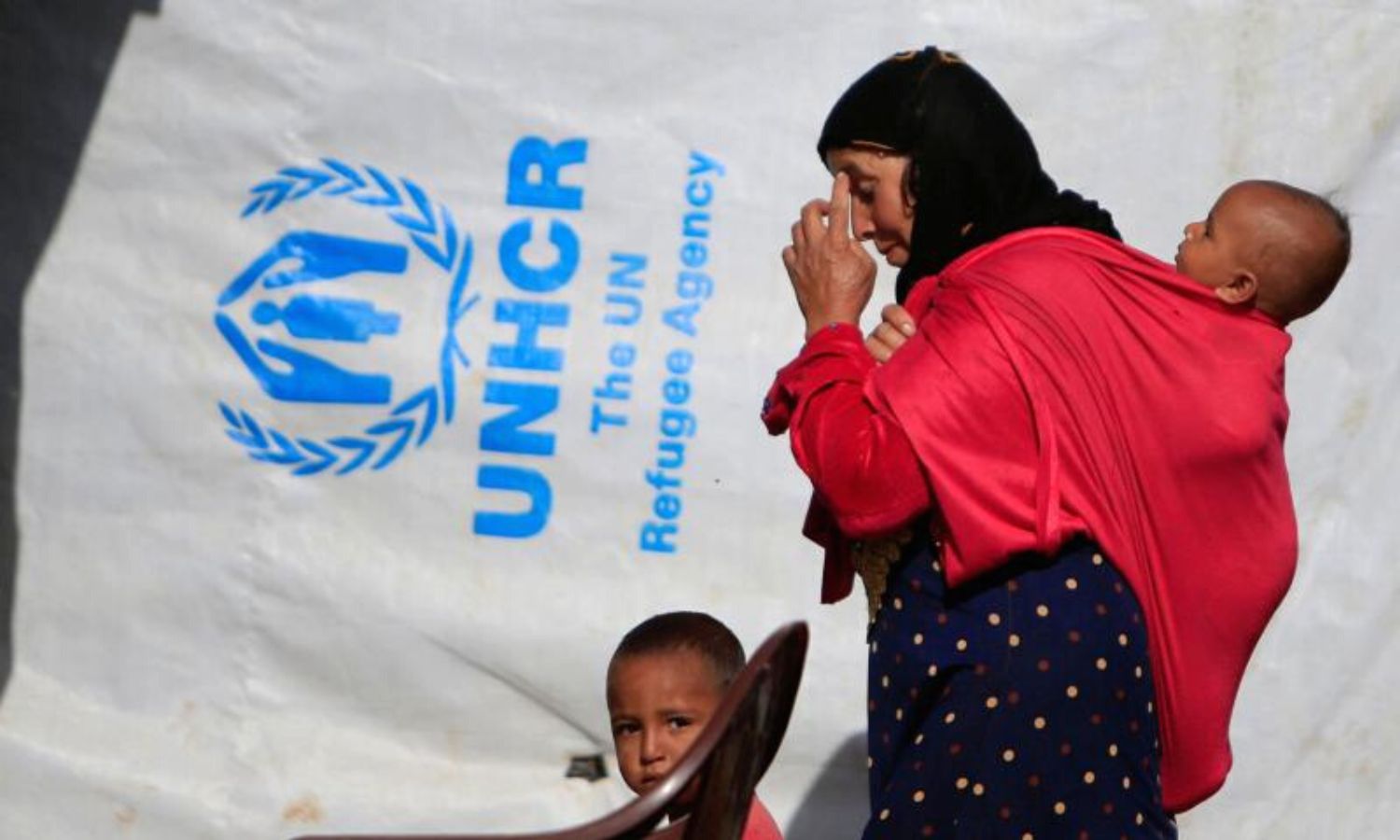
A Syrian woman walks with her children near a tent in a refugee camp in Lebanon – 16 November 2017 (Reuters)
The banking crisis since 2019 has clearly emerged as a result of smuggling huge funds out of Lebanon, and depositors have become in great trouble as a result of the inability to withdraw from their balances or obtain their bank savings.
The explosion of Beirut Port in August 2020 deepened Lebanon’s suffering and created more related crises, as a government vacuum ensued, which was managed by a caretaker government for about 13 months before the birth of the Mikati government on 10 September 2020.
In recent months, the wheat buried under the destroyed wheat silos in the port of Beirut was brought to the surface through burning smoke and odors, given the amount of grain on the eastern side of the silos of the port of Beirut is three thousand tons.
In addition, there is a crisis in energy resources, which is very clearly manifested by the absence of the slightest stability in fuel prices, in addition to a sharp decline in the value of the Lebanese pound, which has lost about 90 percent of its value against the US dollar.
Related crises are represented in the plans to obtain Egyptian gas through Syria and import electricity from Jordan through Syria, but they are still hostage to the American decision under the Caesar law and the consequent penalties.
This is accompanied by the faltering negotiations to demarcate the maritime borders with Israel in order to open the door for oil extraction from oil-rich fields and economic zones at a rapid pace as well.
All of these facts were reflected in the living reality of the residents of Lebanon, both citizens, and refugees, which made the refugee a part of the political discourse by being held responsible with no role in it.
Dr. Talib Saad, an expert in political economy, explains the case that with the limited resources in a society, more focus is given to the parties that benefit from it and who has the priority to benefit from it.
“It turns into a subject of controversy and discussion, regardless of the points of view that are presented and who agrees with them or not,” he added.
The Lebanese government has tended to address the problem according to its point of view or mitigate it by preparing for the return of Syrian refugees to Syria.
The Iraqi political analyst, Dr. Omar Abdulsattar, spoke to Enab Baladi about the file of returning refugees and how the Astana process failed to contribute to the implementation of a political process in Syria after the failure of the Geneva talks between the regime and the opposition.
The researcher also pointed out the absence of a state of calm in Syria within the Turkish talk about a safe area and the state of tension on the border with Jordan.
Regardless of the conflict between the Astana and Geneva axes, the Lebanese leadership seeks to return the refugees to areas under the regime’s control and not to areas that are safe or outside its control, as Turkey is doing, at least for now.
Abdulsattar also pointed to the hegemony of the Syrian regime in Lebanon through the Lebanese Hezbollah, explaining that Lebanon’s return of the refugees means that the Syrian regime has returned them, or at least will leave the file open unless the situation of Hezbollah in Lebanon is addressed, which has recently been a topic of discussion in the high-level political meetings, such as that of French President Emmanuel Macron and Saudi Crown Prince Mohammed bin Salman.
For his part, the Lebanese lawyer, Tariq Shandab, pointed to the rejection of the plan by the UNHCR in Beirut, saying that the Lebanese statements in this regard are a kind of legal, political, and financial blackmail, which has become scandalous, according to his description.
Shandab also questioned the possibility of implementing plans of this kind in the face of a UN opposition that asserts that Syria is not safe or ready for the return of refugees, pointing out that the return of refugees is not linked to the economic situation in Lebanon, given that the crisis in Lebanon is linked to the corruption of the political class and the looting of the Lebanese money.
The Lebanese lawyer stressed the existence of a political, popular, and social campaign against Syrian refugees, led by political parties, with a media campaign to abuse the refugees, without considering that the Syrian regime and Hezbollah are the ones who displaced the Syrian people.
In its report issued on 6 July, Human Rights Watch responded to the Lebanese government’s plan to deport 15,000 refugees per month, saying that the forcible return of Syrian refugees is a violation of Lebanon’s obligations not to forcibly return refugees to countries where they face a clear risk of torture or other forms of violence or persecution.
Lebanon is obligated not to return or extradite anyone at risk of torture and is bound by the principle of non-refoulement in customary international law, as a party to the Convention against Torture and Cruel, Inhuman or Degrading Punishment, according to the report.
The UN Humanitarian Coordinator in Lebanon, Najat Rushdi, stated that the Lebanese government must abide by the principle of non-refoulement under international law and the principle of ensuring the safe, voluntary return of Syrian refugees in accordance with Security Council Resolution 2254 in 2015.
Rushdi called to refrain from fueling negative feelings and hatred in the media and social media and to continue to show a spirit of solidarity and mutual respect, according to a statement published on 22 July.
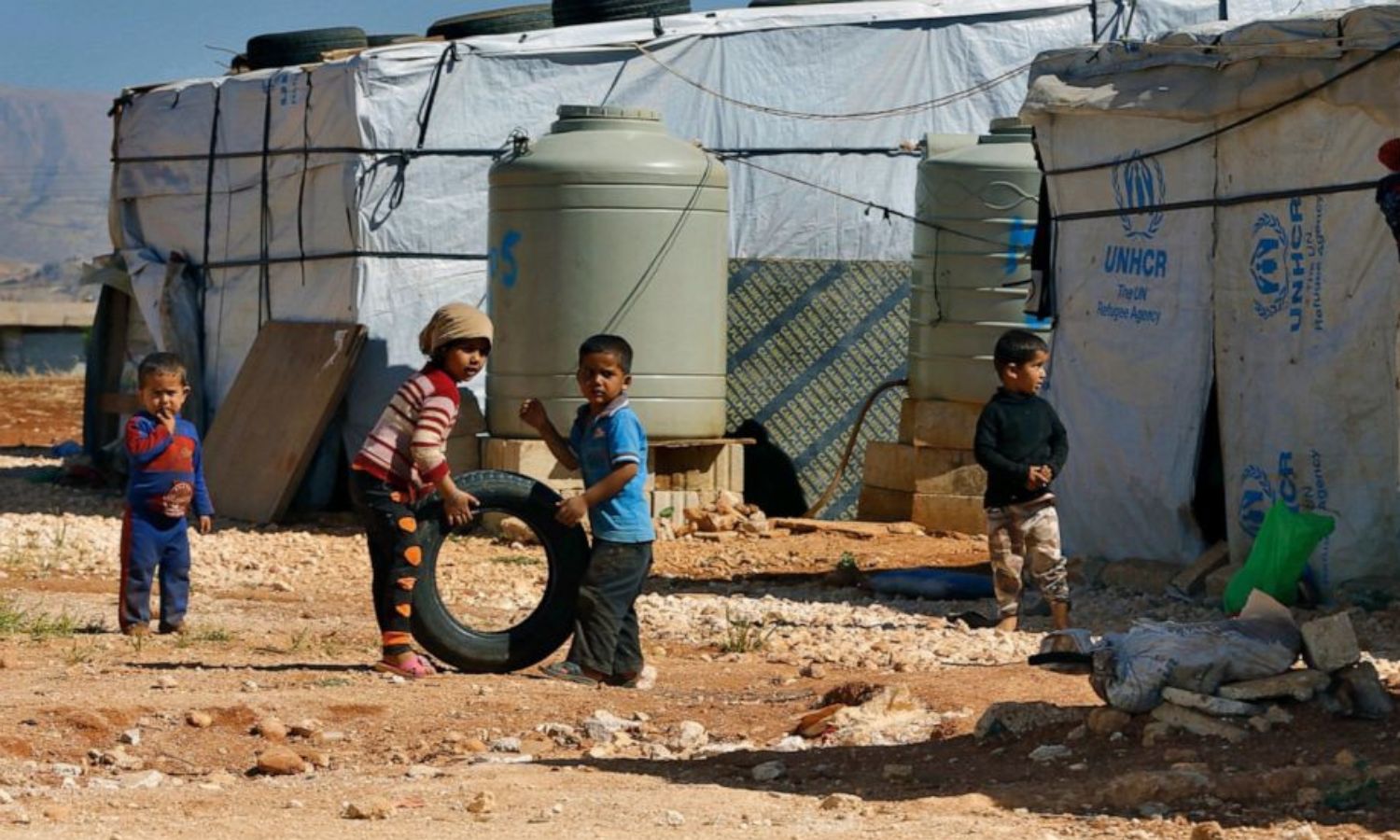
Syrian refugee children playing outside their families’ tents in a refugee camp in Baalbek city, Lebanon – 20 June 2017 (AP)
Violations against Syrian refugees in Lebanon range from racist rhetoric and incidents of hate to the burning of camps, killing, or sexual assault.
On 27 July, the Lebanese security services found the corpse of refugee Hussein Jumaa al-Hamoud, slain with a knife, in a refugee camp in the town of Sha’at in Bekaa Valley after a report from the refugees residing in the camp, according to what the Lebanese newspaper An-Nahar reported at the time.
Lebanese youths also burned a camp in the town of Tel Hayat, Ramool, in the Akkar Plain in northern Lebanon, on 24 July, after a Syrian youth resident of the camp was accused of involvement in the murder of a Lebanese youth.
After the fire was extinguished, a statement was issued by the family members of the deceased, after all the residents of the camp had left, in which they demanded that the security services reveal those involved, return people to the camp and “protect the Syrians from sedition.”
This incident was preceded by an earlier crime in which a 14-year-old Syrian boy was killed in the southern area of Ain al-Qantara-Sarafand after he was beaten by four Lebanese (a father and three of his children).
Khaled Mansour al-Saleh died of his severe injuries in the al-Ra’i Hospital, to which he was transferred, and the security forces arrested those involved and stated that investigations are underway to find out the circumstances of the crime, according to the Lebanese National Media Agency.
In another incident, and through a video recording that circulated on 22 June, a number of Syrian and Lebanese youths, including minors, appeared with semi-naked bodies showing signs of beatings and torture, their mouths closed with potatoes, and they were photographed in a humiliating condition.
Activists who circulated the recording on social media said that the owner of a cherry farm from Akkar accused Lebanese and Syrian workers, after four working days, of stealing a wristwatch and sunglasses to avoid paying their wages.
When they denied having anything to do with them, he sent several men who flogged them with electric cables in addition to beating and humiliation.”
The incident that took place in the town of Majdal al-Aqoura in the district of Jbeil received a wide interaction through social media, for the Lebanese security forces to publish a statement in which they said that they had opened an investigation into the incident by the concerned police station at the request of the competent judiciary, and took an order from the prosecution to bring the perpetrator for investigation.
It is worth mentioning that the violations were not limited to some Lebanese citizens but also included the security services.
A report by Amnesty International in March 2021, entitled “‘I Wished I Would Die’: Syrian refugees arbitrarily detained on terrorism-related charges and tortured in Lebanon,” documented an array of violations committed by primarily Lebanese military intelligence against 26 detainees, including fair trial violations as well as torture – including beatings with metal sticks, electric cables, and plastic pipes. Detainees also described being hung upside down or forced into stressful positions for prolonged periods of time.
Violations against Syrian refugees in Lebanon do not echo a wide coverage through the various Syrian media outlets, including the official media and media close to the regime.
The coverage is limited only to some cases that receive interaction on social media, turning them into a public opinion issue.
According to what Enab Baladi monitored, the last report published in this regard was by the pro-regime al-Watan newspaper on 23 June that the Syrian embassy in Lebanon directly intervened, and Ambassador Ali Abdul Karim Ali contacted the concerned authorities, where the assailant was arrested, knowing that the attack took place against Syrian and Lebanese citizens.
The newspaper reported that a source in the embassy said that the Syrian government had intervened to arrest the assailant of the Syrians in the Akkar region in Lebanon, considering what happened as “an isolated incident because the assailants are Syrians and Lebanese.”
On the other hand, what was recently published on the official website of the Syrian News Agency (SANA) was that the firefighting teams of the Lebanese Civil Defense put out a fire that broke out in a camp for “displaced Syrians” behind the municipality of Qab Elias in the eastern Bekaa Valley, on 21 February.
It was preceded by another SANA report of putting out another fire in a Syrian camp in the outskirts of the town of Benin in the Akkar district, northern Lebanon, on 4 July 2021, without knowing the causes of the two fires, which SANA reported on the Lebanese National Media Agency.
On 4 January 2021, a delegation from the Syrian Embassy in Beirut visited the Syrian refugees affected by a fire that broke out in the Bahnein camp in Miniyeh district after a number of people set it ablaze, displacing hundreds of people and causing great material damage, according to the embassy’s statement.
The statement focused on the delegation’s “distribution of financial aid to those affected who thanked the President of the Syrian regime, Bashar al-Assad, for services and facilities” in an attempt to benefit from the incident in propaganda.
In July 2020, the media came to the fore in the case of a 13-year-old Syrian child being raped by three young men in the Lebanese town of Suhmar, which required an official comment by the Syrian ambassador to Lebanon, Ali Abdel Karim Ali, on the case, considering that it had been raised to achieve goals, hinting to the Assad opponents.
At the time, BBC Arabic stated that the case extends to about two or three years ago, but the appearance of a newly published video recording documenting the “psychological and physical suffering” that the child experienced brought the case back to the fore.
All previous statements and comments on violations were not followed by any statement or clarification about the accountability of the aggressors or where the issues of their accountability reached, or the talk about the situation of those affected.
An increase in the severity of violations against Syrian refugees was accompanied by many personal calls and demands through pages either close to the victim of the violation or from other websites and pages and calls to hold the perpetrators of violations accountable by the judicial authorities amid the presence of human rights and humanitarian organizations concerned with defending the rights of Syrian refugees in Lebanon.
The Executive Director of the Franco-Lebanese Access Center for Human Rights (ACHR), Mohammad Hassan pointed out that there are civil society organizations that defend refugee humanitarian issues, but the size of the needs and the number of incidents exceed the capacity of the institutions, which means that there is no possibility of working on individual issues completely; however, human rights groups seek to defend refugees with a focus on collective issues.
There is no official body that bears its responsibilities towards the Syrian refugee file, except for the United Nations High Commissioner for Refugees (UNHCR), and it has not yet been able to meet the refugees’ needs effectively, as its legal office does not always respond to refugees’ communication attempts in emergency situations, Hassan told Enab Baladi.
According to the Executive Director of ACHR, there are institutions that may be partners with UN organizations concerned with providing legal support or legal advocacy, as well as independent civil society organizations as well, but they are few and limited due to limited funds.
Refugees or IDPs?The UNHCR calls the Syrians who left their areas of origin in the country and headed to Lebanon refugees, enjoying all the rights stipulated in the International Convention on the Status of Refugees, while the Lebanese authorities call them “displaced persons” so that they are not responsible for securing their rights. IDPs, unlike refugees, are people who have not crossed an international border in search of safety but remain displaced within their own countries. The displaced remain within their countries and under the protection of their governments. |
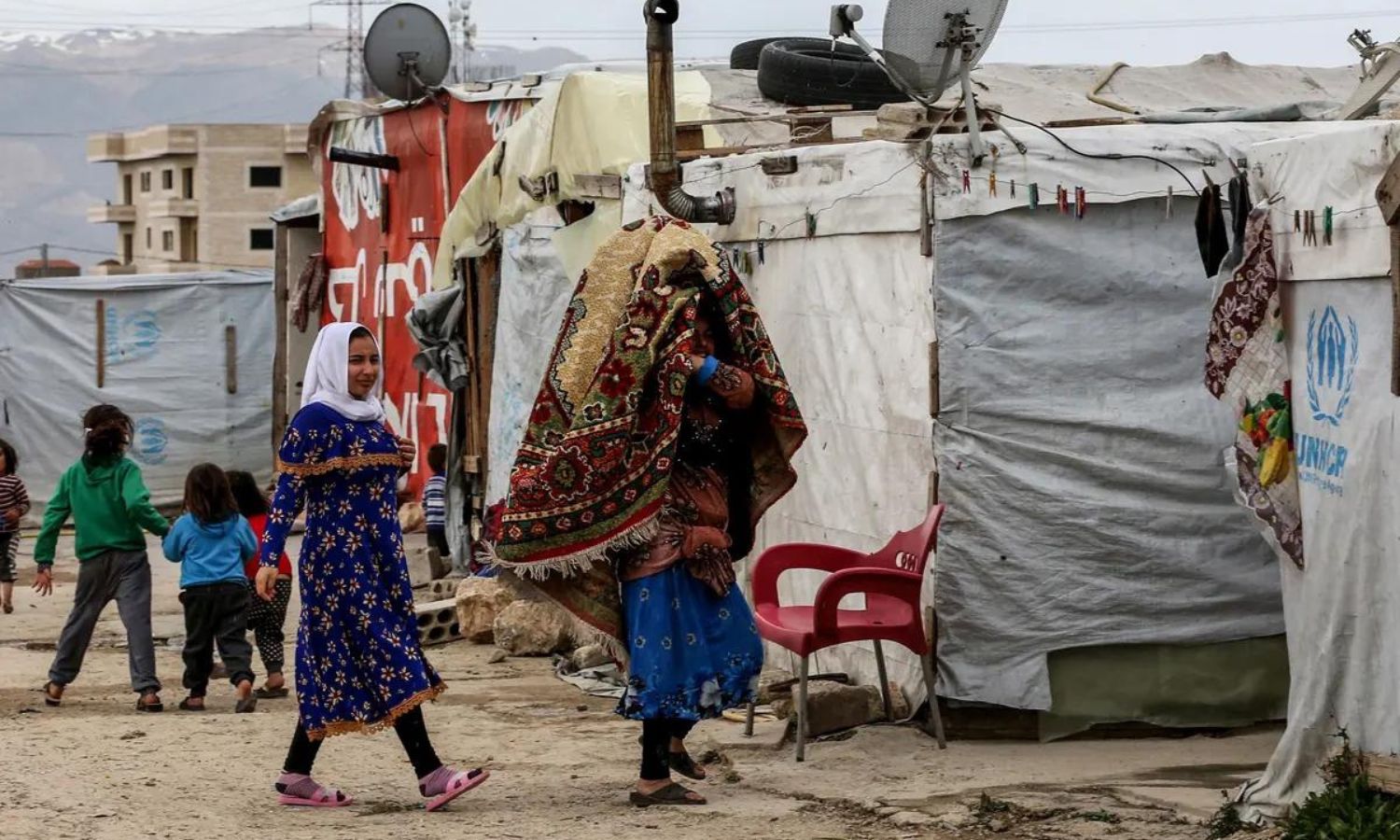
Refugees in a camp inhabited by Syrians and Palestinians in the Bekaa Valley in Lebanon – March 2020 (EPA)
Syrian refugees are forcibly deported on a monthly basis, according to the documentation of human rights organizations, even before announcing the latest plan to deport 15,000 refugees, in light of the government’s conviction that Syria is safe and the growing popular discontent with the refugees.
The deportation decisions usually come in the implementation of the decision issued by the Lebanese Supreme Defense Council to deport Syrians who entered Lebanon surreptitiously after 24 April 2019, as it stopped issuing registration documents with the UNHCR since 2015 to limit the increase in the number of refugees, according to what was documented by Access Center for Human Rights (ACHR).
Hassan, ACHR’s executive director, told Enab Baladi that the center had documented 112 cases of repatriation of Syrians in Lebanon from 2019 to June 2022, in addition to the General Directorate of Lebanese General Security returning 6,345 Syrians between 25 April 2019 and 19 September 2021.
A joint report by rights groups, including Access Center, documented the most prominent violations suffered by Syrians repatriated from Lebanon.
These violations ranged from arbitrary detention to torture and violations of housing and property rights. The impact of the violations was exacerbated by the lack of IDs and other identification papers and the lack of access to such documents.
Lebanon adheres to the International Convention on Human Rights, which it co-founded and announced in 1948, and its first paragraph of Article 14 states, “Everyone has the right to seek and enjoy asylum in other countries for freedom from persecution.”
In 1951, Lebanon did not sign the International Refugee Convention in order to escape the reception of Palestinian refugees, who began forced asylum after the 1948 Nakba.
Since the displacement of thousands of Syrian refugees to the border areas with northern Lebanon, the Lebanese government has reached understandings with the UNHCR so that Lebanon will be a conduit for resettlement requests and not a home for refugees, provided that the Lebanese government commits not to forcibly return any refugee to Syria, says Nabil al-Halabi, a Lebanese lawyer who advocates for refugee cases.
Despite all the agreements, deportations of refugees were taking place, “handovers were taking place, but as soon as human rights organizations intervened, they were suspended, especially if we were facing a case of extraditing an opponent to the Syrian regime,” al-Halabi told Enab Baladi.
The Lebanese security services cooperated with their Syrian counterparts to extradite officers and soldiers who defected from the Syrian regime and worked systematically to persecute, prosecute and harass opposition refugees while allowing thousands of refugees supporting the Syrian regime to free political expression and vote in the presidential elections inside Lebanon, according to al-Halabi.
The Lebanese government did not differentiate between these two groups (pro-Assad and anti-Assad) to create a social climate hostile to the Syrians in Lebanon, through which it would be easier for it to confront human rights defenders when it decided to deport the refugees as “economically displaced,” in addition to holding them responsible for the economic and social crisis before the international community and “blackmail it” through the refugee file, to obtain more financial grants and facilities, al-Halabi concludes.
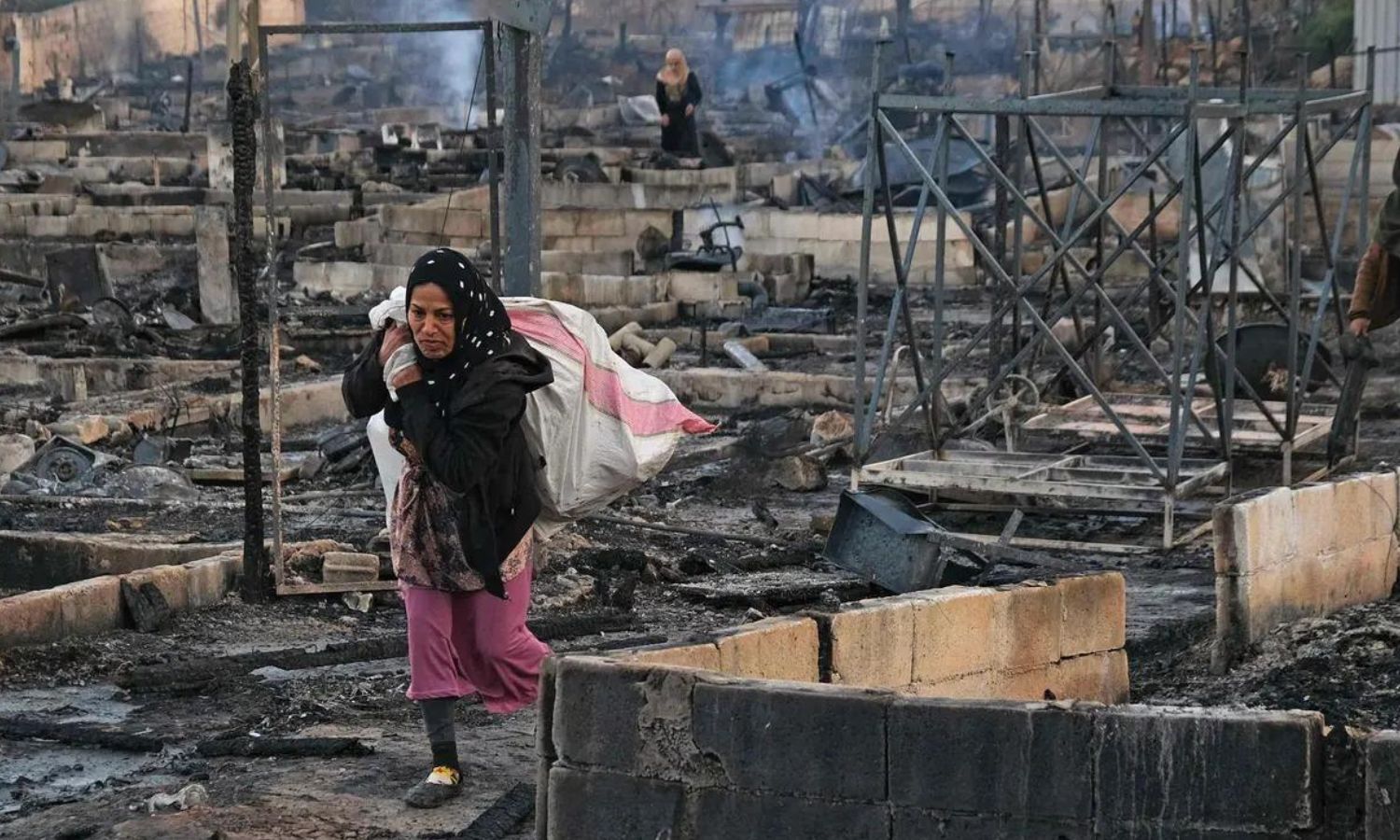
Syrian refugees retrieve their belongings from a camp that was set on fire in the town of Behnin in northern Lebanon – 27 December 2020 (AFP)
Representatives of many countries, including Britain and the United States, reiterated during a Security Council session on Syria on 29 June that Syria is not safe and that conditions are not conducive to a dignified and voluntary return of Syrian refugees.
In October 2021, the HRW published a report in which it said, “The horrific accounts of torture, enforced disappearance, and violations against refugees returning to Syria should make it clear that Syria is not safe for return. Widespread violations of property rights and other economic hardships also make sustainable return impossible for many.”
The UNHCR affirms that “the current conditions in Syria are not conducive to voluntary return in safety and dignity.” Areas in Syria continue to witness a complex security situation and face the threat of military operations and arbitrary arrests, with the absence of security stability as an important and enabling pillar for both early recovery and the safe return of refugees and displaced persons.
Amnesty International documented that a number of Syrian refugees who returned to their homes were subjected to arrest, disappearance, and torture at the hands of the Syrian regime forces, which proves that it is still not safe for Syrian refugees to return to their country, in its report issued in September 2021.
Last June, the Dutch Ministry of Foreign Affairs issued a report on the situation in Syria, confirming that returnees from outside Syria were subjected to many violations by the Syrian regime forces, even in cases of a security settlement.
The report indicated that the economic collapse is getting worse, as nearly 90 percent of the Syrian citizens live below the poverty line, and more than 12 million people suffer in one way or another from difficulties in securing food.
Regarding the damage to infrastructure, the report said that 80 percent of the cities such as Aleppo and the suburbs of Damascus was subject to “massive devastation.”
The Syrian Network for Human Rights (SNHR) has also documented, from the beginning of 2014 until last June, more than 3057 cases of arrest, including 244 children and 203 women, at the hands of the Syrian regime forces against refugees, the majority of whom returned from Lebanon to Syria.
During a visit she made to the Zaatari refugee camp on the Jordanian border in November 2021, the US Ambassador to the United Nations, Linda Thomas Greenfield, said, “my major takeaway from this visit is that the international community must be vigilant in ensuring that any refugee returns are safe and voluntary, and dignified. After ten years of war, we know that hosting hundreds of thousands of refugees is no easy task”.
Greenfield said in a press statement at the time, “There is no question that the current environment in Syria is not conducive to return.”
Mohammad Hassan, executive director of Access Center for Human Rights (ACHR), told Enab Baladi, “Since Syria is still classified as an unsafe country, moving forward with the implementation of the collective deportation plan holds Lebanon highly responsible for its commitments to international treaties and agreements.”
Hassan added that any move by the Lebanese government towards forcibly returning any individual to his country without giving him sufficient time to present his defense and object to the decision to deport him or to search for another country to move to, if any, is a violation of international law to which Lebanon is bound.
The recent statements about the Lebanese plan caused an increase in the deportation of refugees or forced them to return to Syria, and contributed to “fueling feelings of hatred” among Lebanese communities towards the refugees, in addition to the silence of those concerned about standing up to the government’s responsibilities by not violating international laws, Hassan concluded.
if you think the article contain wrong information or you have additional details Send Correction